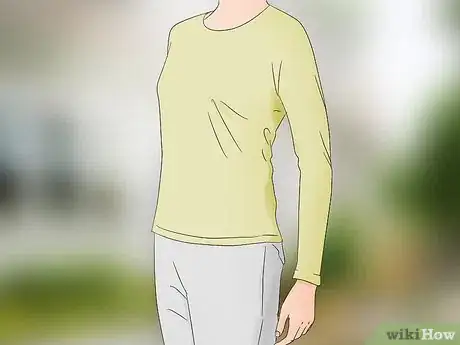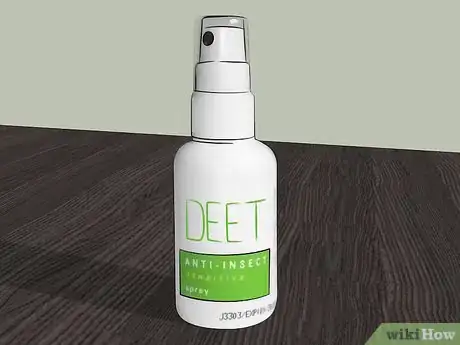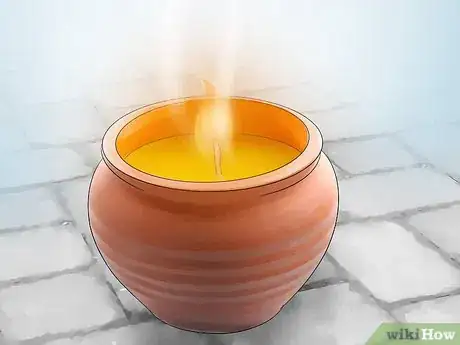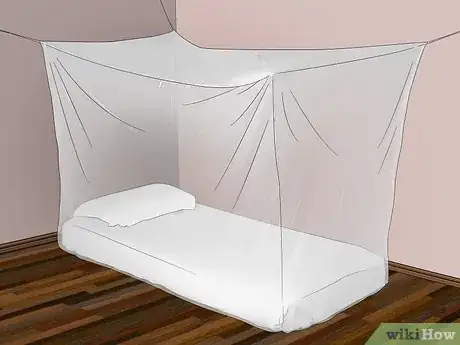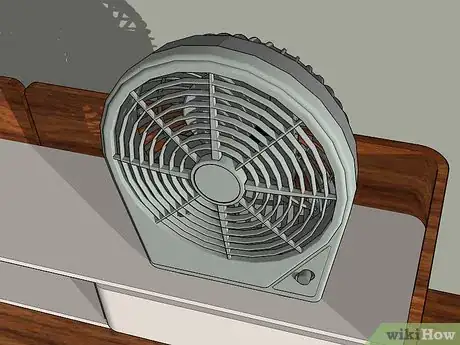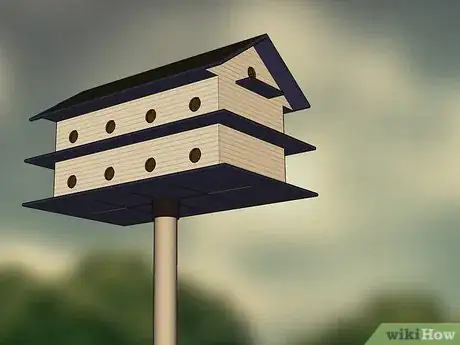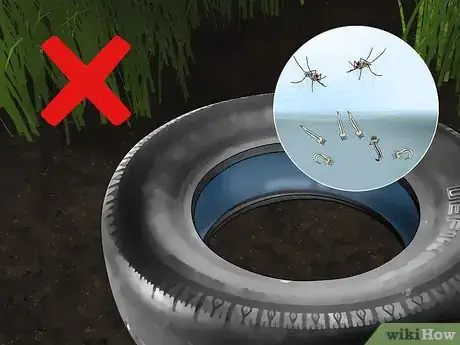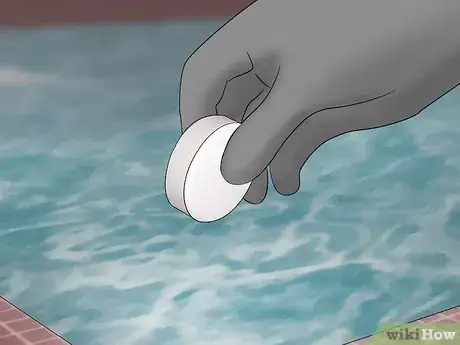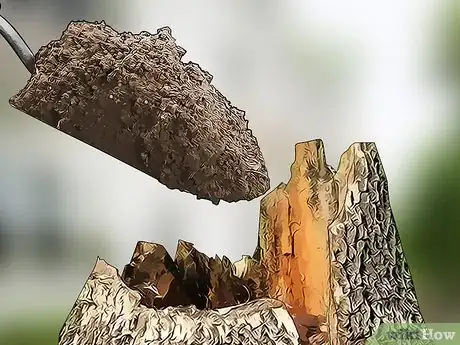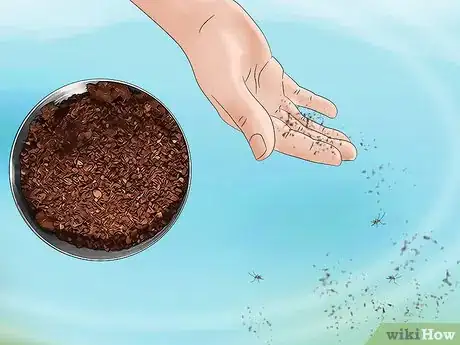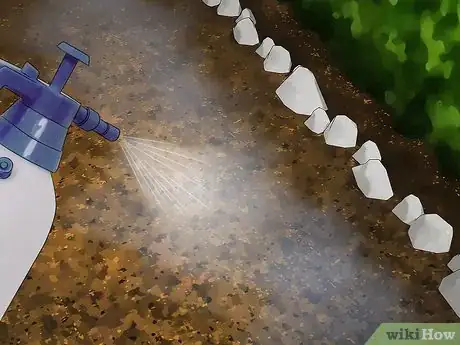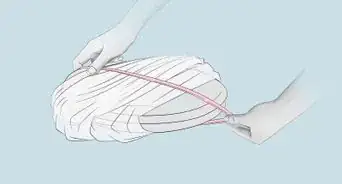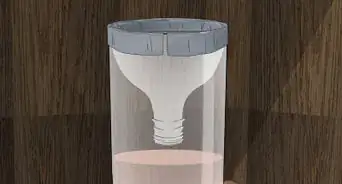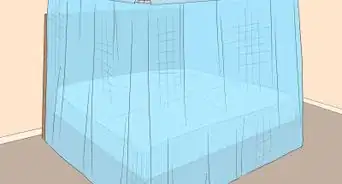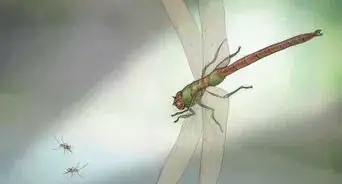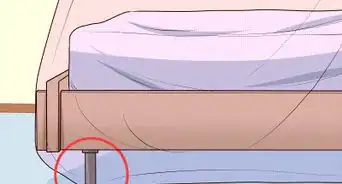This article was co-authored by Joshua Bloom. Joshua Bloom is a Pest Control Specialist and the Vice President of Operations of Standard Pest Management, a pest control company based in New York City. He has over 20 years of experience in the pest control industry and specializes in commercial and large facility pest control management. Standard Pest Control also specializes in ant, bed bug, cockroach, fly, and rodent control. Joshua is licensed by the NYSDEC (New York State Department of Environmental Conservation) for termite control.
There are 12 references cited in this article, which can be found at the bottom of the page.
This article has been viewed 323,700 times.
Mosquitoes are some of the peskiest insects around. Not only can they ruin your outdoor plans once they start biting, but they can also carry a range of harmful diseases. With proper dress, repellents, and some easy home maintenance, you can re-claim your outdoor adventures, gatherings, and space while keeping mosquitoes far, far away.
Steps
Protecting Your Body
-
1Wear long sleeves, pants, and closed shoes. Mosquitoes are attracted to sweat and the natural bacteria that congregate on your skin. Keeping yourself covered in long sleeves, pants, and shoes will reduce mosquito attraction and also make it harder for them to bite you.[1]
- Many outdoor superstores carry lightweight outerwear, so that wearing long layers is still cool and comfortable even in extremely warm temperatures.
- Choose light-colored clothes, like whites, tans, and pastels. Mosquitoes are attracted to dark colors, like black and navy.
-
2Use mosquito repellent. Sprays and lotions that contain DEET are highly effective for warding off mosquitoes while you enjoy the outdoors. DEET is safe when used as directed and can be used on kids as young as 2 months, but be sure to read safety and application instructions before applying.[2]
- All lotions and sprays eventually wear off, so be sure to follow application instructions.
- If you prefer to use a natural homemade repellent, combine 2 ounces of witch hazel and 2 ounces of distilled water in a spray bottle and add a total of 40 to 50 drops of essential oil, like citronella, eucalyptus, and lemon essential oils (you can choose your own combination). You'll want to use half the amount of drops if you're applying the repellent to children under 3 years old.[3]
Advertisement -
3Light candles with geraniol wax or citronella. Geraniol candles are 5 times more effective than citronella in repelling mosquitoes, so it’s best to buy those candles, though not everyone finds the smell as pleasant as citronella candles.[4]
- Although citronella is not particularly effective in repelling mosquitoes, the smoke from the burning candle does help confuse them, which prevents them from biting you.[5]
-
4Use tents or mosquito netting. If you’re hosting a garden party or hoping to lay in your hammock for a leisurely nap, consider moving inside a tent or under mosquito netting.
- Tents and netting won’t necessarily keep mosquitoes far away, but they will keep them off of your skin, provided that you keep tent flaps and doors tightly closed and allow the netting to drape on the ground and make a seal against the intruders.
-
5Turn on fans. Mosquitoes are not strong fliers, so electric fans strategically placed around you or your deck make it increasingly difficult for the pesky insects to reach you and bite. Mosquitoes are also highly attracted to the CO2 humans expel, and the fans help dissipate that, as well.[6]
-
6Stay away from tall grass, standing water, and heavily wooded areas. These areas are where mosquitoes are most likely to live and breed, so by staying away from these areas, you are less likely to attract mosquitoes and get bitten.
-
7Stay indoors in the evening. Mosquitoes are most active at night, beginning around dusk. If you head inside at night and wait until the next morning to resume your outdoor activities, you are less likely to get bitten.
Making Your Environment Mosquito-Free
-
1Hang bird and bat houses outside. Birds and bats are natural predators of mosquitoes. By giving them a place to live near your home, you encourage them to stay and feast, which naturally reduces your mosquito infestation. Birds and bats will eat a number of other insect pests as well.[7]
-
2Mow your lawn weekly. Mosquitoes like to hide in tall, lush grasses. Remove the clippings after you have mowed. They can continue to host insects after they fall to the ground.[8]
-
3Grow mosquito-repelling plants in your yard or garden. Lavender, marigolds, lemon balm, pennyroyal, catnip, and basil are just a few of many plants you can grow near your home that will help deter mosquitoes.[9]
-
4Remove sources of stagnant water. Fill in holes and uneven areas around your home. These places can collect water, giving mosquitoes a place to breed.[10]
- You can buy concrete patch to fill foundations and driveways or simply pay a contractor to fill holes around your home with a professional grade product.
- Remove canisters or containers that gather water in the rainy or snowy seasons. Cisterns, tarps, barbecues, garbage cans and plant pots that fill with water are excellent mosquito breeding grounds.
- Regularly dump and clean birdbaths and pet dishes (where mosquito larvae can collect) every 24-48 hours.
-
5
-
6Fill in tree stumps. Tree stumps are a mosquito breeding area that people often ignore. Fill the tree stumps full of sand, soil, or gravel to avoid dampness and water accumulation.[13]
-
7Spread coffee grounds in stagnant water. Coffee kills mosquito larva, so by spreading coffee grounds in puddles, ditches, or marshy garden areas near your home, you can help reduce their populations.[14]
- Don’t put coffee grounds in ponds or wetlands where fish, birds, or other marine life thrive so that you don’t pollute their habitat.
-
8Use industrial-strength pesticides if you live near heavily-wooded areas or marshes. You can hire professionals to come and spray around your home for mosquitoes. If you have a pond or large body of water, they can spray larvicides that kill mosquito larva but remain non-toxic to other marine life.[15]
- In some regions, you can buy and spray the pesticides yourself. Rules and regulations differ depending on where you live.
- Some counties and districts in North America spray entire communities for mosquitoes. To find out more about your area’s pesticide use and spraying procedure, contact your local health department.
Expert Q&A
-
QuestionWhich ingredients repel mosquitoes?
 Joshua BloomJoshua Bloom is a Pest Control Specialist and the Vice President of Operations of Standard Pest Management, a pest control company based in New York City. He has over 20 years of experience in the pest control industry and specializes in commercial and large facility pest control management. Standard Pest Control also specializes in ant, bed bug, cockroach, fly, and rodent control. Joshua is licensed by the NYSDEC (New York State Department of Environmental Conservation) for termite control.
Joshua BloomJoshua Bloom is a Pest Control Specialist and the Vice President of Operations of Standard Pest Management, a pest control company based in New York City. He has over 20 years of experience in the pest control industry and specializes in commercial and large facility pest control management. Standard Pest Control also specializes in ant, bed bug, cockroach, fly, and rodent control. Joshua is licensed by the NYSDEC (New York State Department of Environmental Conservation) for termite control.
Pest Control Specialist Eucalyptus, lemon essential oil, and picaridin are effective ingredients in mosquito repellents.
Eucalyptus, lemon essential oil, and picaridin are effective ingredients in mosquito repellents. -
QuestionWhat natural things keep mosquitoes away?
 Joshua BloomJoshua Bloom is a Pest Control Specialist and the Vice President of Operations of Standard Pest Management, a pest control company based in New York City. He has over 20 years of experience in the pest control industry and specializes in commercial and large facility pest control management. Standard Pest Control also specializes in ant, bed bug, cockroach, fly, and rodent control. Joshua is licensed by the NYSDEC (New York State Department of Environmental Conservation) for termite control.
Joshua BloomJoshua Bloom is a Pest Control Specialist and the Vice President of Operations of Standard Pest Management, a pest control company based in New York City. He has over 20 years of experience in the pest control industry and specializes in commercial and large facility pest control management. Standard Pest Control also specializes in ant, bed bug, cockroach, fly, and rodent control. Joshua is licensed by the NYSDEC (New York State Department of Environmental Conservation) for termite control.
Pest Control Specialist Citronella, geraniol, and neem oil are all natural options when it comes to repelling mosquitoes. Unfortunately, the natural options aren't effective for nearly as long as the commercial stuff. DEET and picaridin are going to be way more effective than any natural repellent.
Citronella, geraniol, and neem oil are all natural options when it comes to repelling mosquitoes. Unfortunately, the natural options aren't effective for nearly as long as the commercial stuff. DEET and picaridin are going to be way more effective than any natural repellent.
Things You'll Need
- lawn mower
- bird and bat houses
- coffee grounds
- spray bottles
- marigolds
- scented geraniums
- eucalyptus
- distilled witch hazel
- DEET insect repellent
- fans
- long-sleeved shirts/long pants
- mosquito repelling candles
Warnings
- Be sure to read all ingredient and application instructions before purchasing any type of mosquito repellent, spray, lotion, or candles. Some people may be allergic to certain ingredients.⧼thumbs_response⧽
- Keep your pets away from mosquito-treated areas, so that they don’t get sick from ingesting any chemicals.⧼thumbs_response⧽
References
- ↑ http://www.goodhousekeeping.com/institute/a19515/mosquito-repellents-for-your-next-party/
- ↑ Joshua Bloom. Pest Control Specialist. Expert Interview. 22 April 2020.
- ↑ http://oneessentialcommunity.com/diy-bug-spray-works-kid-safe-options/
- ↑ Joshua Bloom. Pest Control Specialist. Expert Interview. 22 April 2020.
- ↑ https://www.thespruce.com/what-really-works-with-mosquito-control-2656381
- ↑ http://www.nytimes.com/2013/07/16/science/a-low-tech-mosquito-deterrent.html
- ↑ http://www.drsfostersmith.com/pic/article.cfm?articleid=1816
- ↑ http://www.mosquitoworld.net/mosquito-control/around-the-home/
- ↑ http://www.naturallivingideas.com/11-plants-that-repel-mosquitoes/
- ↑ Joshua Bloom. Pest Control Specialist. Expert Interview. 22 April 2020.
- ↑ http://www.mosquitoworld.net/mosquito-control/around-the-home/
- ↑ http://www.sandiegocounty.gov/deh/pests/wnv/prevention/chd_wnv_mosquito_fish.html
- ↑ http://www.colonialpest.com/fill-tree-holes-mosquito-management/
- ↑ http://theheartysoul.com/coffee-ground-uses/
- ↑ http://npic.orst.edu/pest/mosquito/mosqcides.html
About This Article
To keep mosquitoes away, start by wearing long sleeves, pants, and closed shoes. You can also use mosquito repellents with DEET to ward off bites. Alternatively, if you prefer a natural homemade repellent, combine 2 ounces of witch hazel with 2 ounces of water in a spray bottle and add 40-50 drops of essential oils like citronella, eucalyptus, or lemon. Instead of or in addition to repellents, light candles made with geraniol wax or turn on fans to keep the bugs away! To learn how to make your environment mosquito-free, keep reading!
